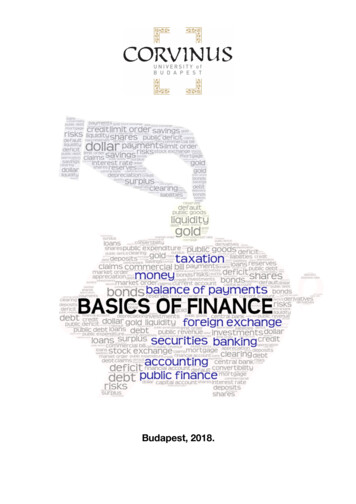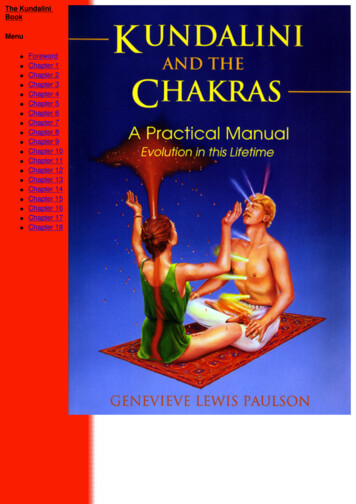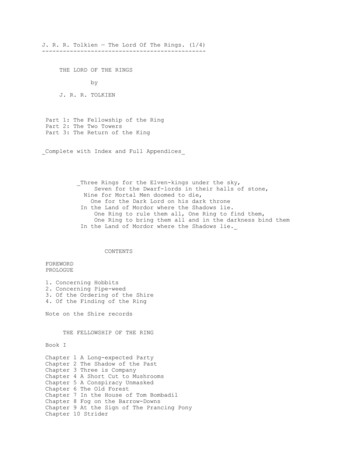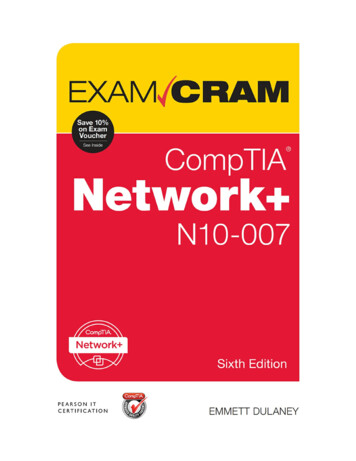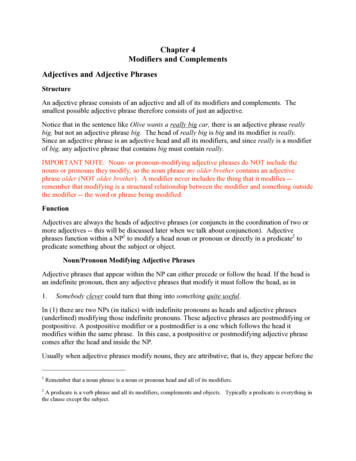
Transcription
Chapter 4Modifiers and ComplementsAdjectives and Adjective PhrasesStructureAn adjective phrase consists of an adjective and all of its modifiers and complements. Thesmallest possible adjective phrase therefore consists of just an adjective.Notice that in the sentence like Olive wants a really big car, there is an adjective phrase reallybig, but not an adjective phrase big. The head of really big is big and its modifier is really.Since an adjective phrase is an adjective head and all its modifiers, and since really is a modifierof big, any adjective phrase that contains big must contain really.IMPORTANT NOTE: Noun- or pronoun-modifying adjective phrases do NOT include thenouns or pronouns they modify, so the noun phrase my older brother contains an adjectivephrase older (NOT older brother). A modifier never includes the thing that it modifies -remember that modifying is a structural relationship between the modifier and something outsidethe modifier -- the word or phrase being modified.FunctionAdjectives are always the heads of adjective phrases (or conjuncts in the coordination of two ormore adjectives -- this will be discussed later when we talk about conjunction). Adjectivephrases function within a NP1 to modify a head noun or pronoun or directly in a predicate2 topredicate something about the subject or object.Noun/Pronoun Modifying Adjective PhrasesAdjective phrases that appear within the NP can either precede or follow the head. If the head isan indefinite pronoun, then any adjective phrases that modify it must follow the head, as in1.Somebody clever could turn that thing into something quite useful.In (1) there are two NPs (in italics) with indefinite pronouns as heads and adjective phrases(underlined) modifying those indefinite pronouns. These adjective phrases are postmodifying orpostpositive. A postpositive modifier or a postmodifier is a one which follows the head itmodifies within the same phrase. In this case, a postpositive or postmodifying adjective phrasecomes after the head and inside the NP.Usually when adjective phrases modify nouns, they are attributive; that is, they appear before the12Remember that a noun phrase is a noun or pronoun head and all of its modifiers.A predicate is a verb phrase and all its modifiers, complements and objects. Typically a predicate is everything inthe clause except the subject.
noun and after the predeterminer and determiner (if they appear in the NP). So, compare (1)where the heads of the italicized NPs are indefinite pronouns with (2) where the heads of theitalicized NPs are nouns.2.Some clever person could turn that thing into a quite useful thing.Nouns can have postmodifying adjective phrases if the adjective phrase is heavy enough -- so*any person clever is no good, but any person really clever and talented is okay.Predicate Adjective PhrasesAdjective phrases can also function directly in the predicate: predicate adjective phrasesdescribe or qualify a NP in the clause. If a predicate adjective phrase is about the subject, thenthat adjective phrase is a subject complement, as in (3) - (5) where the subject complementadjective phrase is italicized and the subject is underlined.3. That person seems really talented.4. Sharon is clever.5. The medicine tasted nasty.If the adjective phrase qualifies or describes the direct object, then the adjective phrase is anobject complement, as in (6)-(8) where the object complement adjective phrase is italicized andthe direct object is underlined.6.They called me stupid.7.Charley considers Sharon clever.8.I found the medicine nasty.Structural Constraints on AdjectivesAdjective phrases with certain heads (in certain meanings) are typically or always postpositive:For example, elect as in the president elect, or proper as in Pullman proper are never usedattributively in these senses.Some adjectives only appear as heads of attributive adjective phrases: For example, late in thesense of "dead" or "former holder the role" can occur as the head of an attributive adjectivephrase, as in (9),9.The late king of France liked toads.but not as the head of a postmodifying adjective phrase, as in *Someone late liked toads and notas the head of either kind of predicate adjective phrase, as in *The king of France is late or *Iconsider the king of France late. Some adjective can be the heads of postpositive or predicateadjective phrases, but not of attributive adjective phrases, for example, afraid and present, as in10. The children present watched the accident in horror.
(but not (10') *The present children watched the accident in horror which would meansomething entirely different—with present meaning something like current as opposed to past orfuture.)11. The small children were afraid.(but not (11') *The afraid children were small.)Adjective phrases which contain complements (which appear after the adjective head) orpostmodifiers typically are not used attributively. So, frightened of bears is okay as apostpositive adjective phrase (as in People frightened of bears shouldn't visit Yellowstone) or as apredicate adjective phrase (as in Those people seem frightened of bears, Their horribleexperience left them frightened of bears.)Noun/Pronoun ModifierAttributivePostmodifyingoccurs before thehead it modifies andafter anypredeterminers anddeterminers -- withinthe NP before thehead it modifies Avery large cat bit thefrightened dog.cannot containadjectivecomplements *Wemust take care ofthose dependent onour help childrenSome adjectives canonly head attributiveadjective phrases:only, late, former,The former presidentwas an only child.Compare *An afraidchild ran away withA frightened childran awayPredicate Adjective PhraseSubjectObject ComplementComplementoccurs immediately afteroccurs after aoccurs after a directthe head it modifies;copularobject noun phraseadjective phrases which("linking") verbpreceded by amodify indefiniteand providescomplex transitivepronouns most beinformation about verb and providespostmodifying;the subject. Heinformation about thepostmodifying adjectivewas asleep. Thedirect object. I left himphrases that modify nouns bell sounded flat. asleep. He called themust be "heavy" (exceptThe food tastedbell flat. Wein certain fixedutterly horrible.considered the foodconstructions) Nobodyutterly horrible.wise would do that.can contain adjective complements We must take care of those childrendependent on our help. Those children are dependent on our help. Thedoctor considered the children dependent on our help.Some adjectives can only appear as the heads of AdjPs which are notattributive: asleep, afraid That man ridiculously afraid ran away. Thatchild is afraid. It made the child afraid. *The president former was anonly child. *The president was former. *I consider that child only.
Practice Identifying Adjective PhrasesIdentify the adjective phrases in the sentences below and to determine what the function of eachadjective phrase each is.(1) The first time I saw the thing, I found its appearance quite surprising. (2) The strange,spotted top attached to the colorfully striped trunk made me dizzy. (3) It was incredibly badlydesigned. (4) Who could have considered purple, blue and red suitable colors for a lectern? (5)(5) Moreover, the ugly thing was unstable. (6) The designer blind to both form and function hadcreated a hideous monstrosity.Adverb and Adverb PhrasesStructureAn adverb phrase consists of an adverb head and all its modifiers; only adverb phrases canmodify adverbs. A substantial number of adverbs are derived from adjectives by suffixing -ly tothe adjective, so, for example, the adverbs frivolously, amazingly, enormously, largely, literally,and abundantly are derived from the adjectives frivolous, amazing, enormous, large, literal, andabundant. Not all adverbs are derived from adjectives however. Some are simply basic adverbslike then, yet, still, thus, ever, just, only, here, there, and again; others are more internallycomplex, but not derived from adjectives, like however, moreover, therefore, and hereafter. Anumber of adjectives and adverbs have the same form (i.e., are homonyms), like early, fast, andhard. In the (a) versions of the examples below the underlined words are adjectives and in the(b) version they are adverbs,12. a. The early bird catches the worm.b. The bird rose early to catch the worm.13. a. I want a fast car.b. My car should go fast.14. a. Mary finished the hard problemb. Mary worked hard on the problem.Notice that if you replace these forms with adjective/adverb pairs that aren't homonyms, only onewill fit in each case so suppose you replace fast with rapid or rapidly. Only rapid will fit in(13a) and only rapidly will fit in (13b). Similarly if you replace hard with intensive orintensively, only the adjective will fit in (14a) and the adverb in (14b).
FunctionAdverbs are always the heads of adverb phrases (or conjuncts in the coordination of two or moreadverbs -- this will be discussed later when we talk about conjunction). Adverb phrases havethree possible functions -- two well-defined and one a kind of grab-bag. Adverb phrases canmodify adjectives, they can modify other adverbs and they can be adverbial. This last function isthe most complicated so it is typically easier to see if an adverb phrase is functioning as anadjective- or adverb- modifier first, before you consider whether it is an adverbial.Adjective ModifierAn adjective-modifying adverb phrase is inside the adjective phrase with the adjective head andmodifying a head adjective (inside the adjective phrase with the head).15. The very small children should stand in the front.16. Mary is remarkably bright.It is worthwhile noticing that while an adjective-modifying adverb phrase typically precedes theadjective it modifies as in (15) and (16), some adverb phrases regularly follow what they modify,so enough as in (17) and (18) typically follows the adjective head it modifies.17. Harry is a good enough parent.18. Those children aren't sleepy enough yet.IMPORTANT NOTE: Adjective-modifying adverb phrases do NOT include the adjectives theymodify, so the adjective phrase amazingly tall contains an adverb phrase amazingly (NOTamazingly tall). A modifier never includes the thing that it modifies -- remember that modifyingis a structural relationship between the modifier and something outside the modifier -- the wordor phrase being modified.Adverb ModifierJust as adverb phrases can modify adjectives, they can also modify adverbs (and therefore appearwithin another adverb phrase) as in (19) and (20).19. The children played very carefully.20. Those jockeys are quite amazingly tall.Notice this means that in a sentence like (20) there are two adverb phrases: quite amazingly andquite. The head of quite amazingly is amazingly and its modifier is quite. The adverbmodifying adverb phrase is quite and its head is quite. Notice that amazingly is NOT an adverbphrase here. Since an adverb phrase is an adverb head and all its modifiers, and since quite is amodifier of amazingly, any adverb phrase that contains amazingly must contain quite. The sameis not true of quite -- since amazingly does not modify quite, there can (in fact, must) be anadverb phrase which contains quite, but not amazingly. Since, in fact, nothing modifies quite,there is an adverb phrase that consists of just quite.IMPORTANT NOTE: Adverb-modifying adverb phrases do NOT include the adverbs they
modify, so the adjective phrase quite amazingly contains an adverb-modifying adverb phrasequite. A modifier never includes the thing that it modifies -- remember that modifying is astructural relationship between the modifier and something outside the modifier -- the word orphrase being modified.AdverbialStructures serving as adverbials do a range of things: they may modify a verb, a verb phrase, apredicate, or the whole rest of the clause; they may focus on some chunk of structure: a nounphrase, an adjective phrase, a verb phrase, a prepositional phrase, a predicate, or another clause.It may express a transition between one clause and another. In other words, this is a more or lessmiscellaneous category. The adverbial role can be filled by a range of structures. The structurewe're primarily concerned with here is the adverb phrase, as in21. He turned carefully.22. Everybody left very early.23. The students left just before dinner.The similar roles can be filled by prepositional phrases, as in24. He turned with great care.25. Everybody left before dawn.and noun phrases, as in26. He turned that way.27. Everybody left the next day.and subordinate clauses, as in28. Everybody left when I arrived.29. He turned to see Mary.
Identifying Adjectives and AdverbsExample:Oscar can work hard at the really efficient factory.(1) Oscar, can, work can all be demonstrated to be nouns or verbs.(2) hard is not a noun, pronoun, verb, demonstrative, or article. It can replaced by anunambiguous adverb: Oscar worked amazingly at the really efficient factory. Therefore, hard isan adverb.(3) at is not a noun, pronoun, verb, demonstrative, or article. It cannot be replaced by anunambiguous adverb: *Oscar worked hard merely/then/quite/clearly the factory. It cannot bemodified by an unambiguous adverb (though the whole PP can be). Therefore, at is neither anadverb nor an adjective.(4) the is an article; therefore, it is neither an adjective nor an adverb.(5) really is not a noun, pronoun, verb, demonstrative, or article. It can be replaced by anunambiguous adverb: Oscar can work hard at the merely/quite/clearly efficient factory. really,therefore, is an adverb.
(6) efficient is not a noun, pronoun, verb, demonstrative, or article. It cannot be replaced by anadverb: *Oscar worked hard at the really merely/quite/clearly/then efficient factory. It can beand is, however, modified by an adverb (really) and is therefore an adjective.Practice Identifying Adverb PhrasesIdentify the adverb phrases in the sentences below and to determine what the function of eachadverb phrase each is.(1) Ferociously the amazingly strong child threw his teacher through a window. (2) He wasangry at his teacher again and he found the entire school increasingly unbearable. (3) Theteacher's careful answer to his very difficult question left him quite furious. (4) A more sensiblestudent would just have gone to the ombudsman with a complaint. (5) He would really not havethrown his hapless teacher out of the classroom. (6) Quite predictably, the slightly injuredteacher was furious at the child's violent treatment of him. (7) He demanded that the insane childbe more appropriately punished for his utterly outrageous conduct. (8) Suspension was acompletely insufficient penalty for this violent offence.Prepositional PhrasesStructureA prepositional phrase (PP) consists minimally of a preposition and its object. The object of apreposition is typically a noun phrase or a gerund subordinate clause (we'll discuss these whenwe talk about complex sentences). Usually the object of the preposition (OP) immediatelyfollows the preposition as in30. I talked [aboutPREP [the answers]OP].31. [AfterPREP [dinner]OP] the people [inPREP [the dining room]OP] rose [fromPREP [the tables]OP]and went [intoPREP [the garden]OP].Under certain circumstances the preposition and its object might not be adjacent to each other. Ifthe object of the preposition is a wh- proform or a phrase containing a wh-proform, then thephrase with the wh- word can appear at the beginning of the sentence (or of the appropriateclause) with the preposition appearing where you might expect to find the entire PP.32. Who are you talking to? (I am talking to Bill.)33. I built the stage which you are standing on. (You are standing on the stage.)
34. What I rely on is the truth.35. What a jerk I ran into!In some of these sentences, it is possible to put the preposition before the wh- word in the front,as in36. To whom are you talking?37. I built the stage on which you are standing.but not others, as in38. *On what I rely is the truth.39. *Into what a jerk I ran!In some cases the OP is missing, but it is always recoverable in context (that means you canalways figure out what the OP would be if it were present).40. I know the man you are talking about.41. The man is hard to talk to.(Notice that (40) can be paraphrased as I know the man about whom you are talking -- in whichwhom is the object of about and (41) can be paraphrases as It is hard to talk to the man -- inwhich the man is the object of to.)If the sentence is a pseudo-passive (a passive in which the subject is the same as the OP in theactive), then the preposition is let without an object, as in42. That bed was slept in by George Washington.( Active: George Washington slept in that bed)FunctionPrepositional phrases can serve as noun modifiers, as adverbials, and as complements to verbs oradjectives.Noun ModifierWe've seen other noun modifiers -- determiners, predeterminers, and adjective phrases. Now wesee that prepositional phrases can modify nouns and pronouns in much the same way. PPs asnoun/pronoun modifiers are always postmodifying, as in43. The man in the blue dress is talking to someone in a bright pink hat.You can stack PP modifiers just as you can stack adjective phrase modifiers -- unlikedeterminers and predeterminers which are limited to one per head modified.44. The man in the orange dress with red hair at that table looks perfectly awful.
One way to tell that the PPs modify the noun or pronoun head is to replace that NP with apersonal or demonstrative pronoun which typically are not modified by PPs, so45. *He in the orange dress with red hair at that table looks perfectly awful.46. He looks perfectly awful.47. I want this book about Spain.48. I want this.49. *I want this about Spain.Passive AgentAs we discussed when we considered passive clauses, the NP that is the same as the subject ofthe active paraphrase of the clause appears as the object of the preposition by in the passive.50. That child was bitten by a yippy little dog. ( Active: A yippy little dog bit that child.)The subject of an active clause can only be conveyed in a passive clause in a prepositional phrasewith the preposition by.AdverbialJust like adverb phrases, PPs can serve as adverbials. Time adverbials and place adverbials arevery typically expressed as PPs, as in51. On Thursday I am going to SpainIn fact however a substantial range of adverbial roles can be filled byVerb ComplementSome verbs may be limited to certain prepositions to appear with. Sometimes the verb requiresthe presence of the PP, as in52. I will rely on your discretionVerbs like rely and depend and deprive require the presence of a PP -- a PP with a particular setof prepositions. You can only rely or depend on or upon something or someone,53. *I will rely.54. *I will rely on top of your discretion.55. *I will rely from your discretion.Similarly you can only deprive someone of something, as in56. Olive deprived us of our just reward.
57. *Olive deprived us from our just reward.58. *Olive deprived us out of our just reward.Often, a good dictionary identifies the verbs that take verb complements by identifying the verb preposition set and its meaning since typically the fact that they are fixed and what themeaning is is not necessarily transparent.Other verbs take optional complements. So call can take a prepositional phrase complement,using the preposition on, to mean 'visit' as in59. Since Harry is at home now, we should call on him.or 'choose', as in60. If you raise your hand, I will call on you.Adjective ComplementLike verbs, adjectives also limit the prepositions that appear in their prepositional phrasecomplements.61. I am fond of them.Notice that while you can be happy with your grade, you can't be *glad or *joyous with yourgrade. So happy selects a prepositional phrase with a preposition with, while glad and joyous(which mean approximately the same thing) do not. Some adjectives like happy appearcommonly without any prepositional phrase complements, as in62. Are you happy?or with other prepositions, as in63. Are you happy for/with your family?Notice that while you can be glad for someone, you cannot be joyous for someone. Againdifferent adjectives, even in the same semantic area, go with different prepositions.Prepositions vs. ParticlesAs it happens, a subset of the prepositions in English are also particles. A particle differs from apreposition in that it does not (and cannot) take an object. Particles can, like prepositions, comeright after the verb and before a noun phrase. Particles, however, are distributed differently fromprepositions. How so? Well, while the up's in (64a) and (b) look similar, consider that in (65b)you can move the up after the NP without changing the meaning, but in (65a) moving the upproduces an ungrammatical string.PrepositionParticle64. a. I climbed up the pole.b. I put up the pole.65. a. *I climbed the pole upb. I put the pole up.
66. a. I climbed up it.b. *I put up it67. a. *I climbed it up.b. I put it up.68. a. I climbed slowly up the pole.b. *I put slowly up the pole.In fact, if the NP is a personal pronoun, you must move the particle after it, as in (67b) (noticethat (66b) is ungrammatical because the personal pronoun follows the particle), but you still can'tmove a preposition after its object (so (66a) is fine -- but (67a) is ungrammatical). Similarlynothing can come between a verb and its particle except the object of the verb (as in (65b) -- but(68b) is ungrammatical because what intervenes between the verb and the particle is anadverbial), but, for example, adverbials can come between a verb and a prepositional phrase (asin (68a)).Consider I looked up the street and Mary looked over the rock. These two sentences areambiguous. Each has a reading in which up or over is a preposition and one in which it is aparticle. What are the two meanings for each sentence and which structure goes with whichmeaning?Many PrepositionsThe following list contains many, though not all, English prepositions. Notice that many of thesewords belong to other categories as well: so around, for example, is also an adverb; but is also acoordinating conjunction; up is also a verbal particle; after is also a subordinating conjunction;excluding is also a verb (an –ing participle or gerund); inside is also a noun; like is also a verb,etc. So you must look at the use in a particular sentence to determine whether the word is apreposition. Consider these sentences:69a. Mary is depending on our help.(LV Prep)b. Depending on the cost, we’ll either drive or fly.(Preposition)70a. I’ll just walk around. (Adverb)b. I’ll just walk around the house. (Preposition)71a. Will you stand up? (Particle)b. Will you climb up that tree? (Preposition)72a. The inside of that building isawful (Noun)b. He is staying inside the house. (Preposition)73a. The following data must be fullyanalyzed. (Adjective)b. Following the first set of data is our firstappoximation of an analysis. (Preposition)As should be evident, you can’t determine whether a word is a preposition just be checking a list.Since words which are preposition can be the same as words which belong to other categories—verbs, adverbs, particles, among others. The list below is not complete—new prepositions arederived (not as commonly or easily as new open class words like nouns or lexical verbs oradjectives or adverbs), but more commonly than new articles or auxiliary verbs. This list, forexample, includes a number of cases of prepositions derived from adjectives or verbs or nounscompounded with more basic prepositions.
aboardaboutaboveaccording toacrossacross fromafteragainstahead ofalongalongsidealong withamidstamongamongstantiapart fromaroundasas foraside fromas opposed toas toastrideas well asataway frombarbarringbecause ndbutbyby means ofby way ofcircaclose toconcerningconsideringcontrary todepending ondespitedownduringexceptexcept forexceptingexcludingfollowingforforward offrominin addition toin accordance within betweenin charge ofin conjunction within connection within contrast toincludingin favour ofin front ofin lieu ofin line within relation toin response toin search ofinsideinside ofin spite ofinstead ofin support ofin the light ofintoin touch within view ofirrespective oflikeminusnearnext tonotwithstandingofoffonon account ofon behalf ofon boardon the part ofontoon top ofoppositeopposite toother thanout ofoutsideoutside ofoverowing topastpendingperpluspluspreparatory toprior torather thanregardingregardless ofrelative toroundsavesave forsincesubject tothanthanks tothroughtilltotogether withtowardtowardsunderunderneathunlikeuntilupup againstuponup toup untilversusviavis-à-viswithwith regard towithinwithout
More Practice with Adjective, Adverb and Prepositional Phrases Identify all the adjectivephrases, adverb phrases and prepositional phrases in the texts below.(1) Circle the entire phrase.(2) Underline the adjective head, adverb head, or preposition.(3) Label each phrase you have circled with its structure (adjective phrase, adverb phrase orprepositional phrase).(4) Label each phrase you have circled with its function (adjective phrase: attributive,postmodifying, subject complement, object complement; adverb phrase: adjective modifier,adverb modifier, adverbial; and prepositional phrase: noun modifier, adjective complement,verb complement, adverbial, passive agent.)Marianne was amused by the absolute presumption of the man in front of her. His sense ofentitlement was breathtaking. He was almost preening. He practically glowed with his belief inhis own attractiveness. From Marianne’s point of view, he was not merely overestimating theeffects of his appearance; he was completely wrong about any effect he might have on her.Anyone so obviously full of himself was actively ugly in her eyes.“Hey baby, call me Bill. What’s your name? he asked with complete assurance andcontinued, “What are you drinking?”“Sorry,” she replied politely, “I’m waiting for someone.” After all, he had done nothingunacceptable in a bar like this one. His approach was utterly standard for this kind ofestablishment. Courtesy was called for in her refusal, but nothing in the relatively odd etiquetteof these places required her to accept his invitation.“Ah, come on,” he said and grabbed her arm.“Please let go of me,” she said, still courteously, “I am waiting for someone else.”The polite lie should have been sufficient; he could walk away now without any loss of face.A man with any sense of appropriate behavior would have released her immediately. However,that kind of man would never have touched a stranger without invitation anyway. Her politeresistance made him even more overbearing. He simply refused to believe that any woman
would refuse his attentions.“Don’t be shy,” he insisted.“I’m not shy, just otherwise occupied,” she answered. “Even if I were not waiting forsomeone else,” she continued, “I choose my own company. Take your hand off me.”“Who’ll make me?” he said and looked around the crowded room of strangers who wereignoring their byplay.Marianne repeated, “Please let go of me.”He laughed and tightened his hold on her arm. At this point, instead of amusement,Marianne’s primary feeling was annoyance. She had apparently underestimated his feelings ofentitlement. She reached over, seized the smallest finger on his offending hand and bent it backuntil he released her arm.“You bitch,” he snarled as he pulled back his hand in a fist as though he would hit her.She stepped to one side and pulled a barstool between them. He knocked it out of the wayand moved toward her. By this point, a number of the other customers could not pretend thatthey did not notice what was happening. A large man came up behind Bill and seized his arm,saying “Forget her. Let’s get a drink.”“No,” he said and shook off the other man’s hold. He turned back toward where Mariannehad been standing, saying “I don’t take .”, but by the time he had turned, she was gone. Duringthe momentary interruption, she had slipped away.“Where is she?” he demanded of everyone close to him as he looked wildly around the room.As Marianne walked down the street, she sighed quietly. She was simply grateful that shehad not had to hurt anything except her would-be Romeo’s overweaning pride.
child ran away with A frightened child ran away Some adjectives can only appear as the heads of AdjPs which are not attributive: asleep, afraid That man ridiculously afraid ran away. That child is afraid. It made the child afraid. *The president former was an only child. *The president

